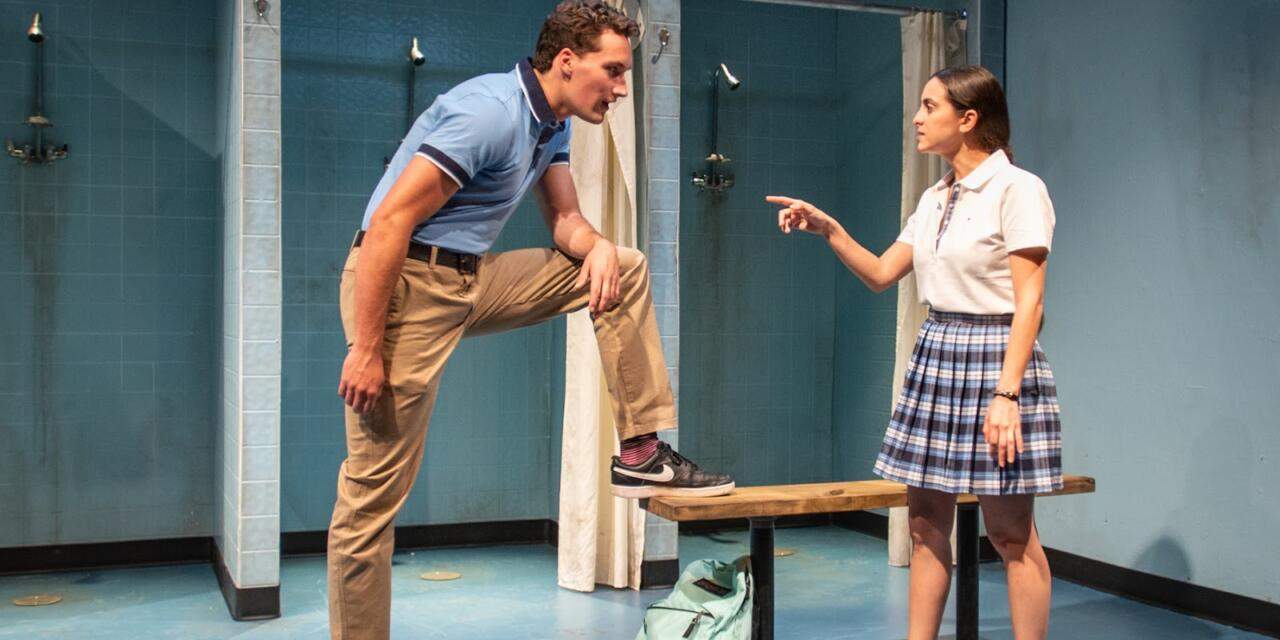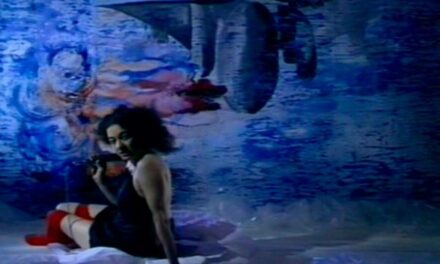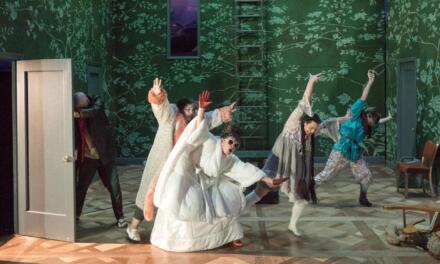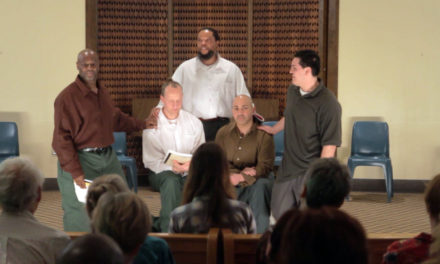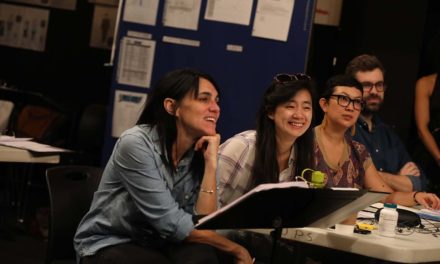Gratitude, by Oren Safdie, directed by Maria Mileaf, and starring Jalen Ford, Jake Bryan Guthrie, Erik Larsson, and Aline Salloum, runs through June 30th at UrbanStages, 259 W 30th St, New York.
Fareeda Ahmed: This play is so provocative, especially since it revolves around the power dynamics and sexuality of teenagers. I’m curious what your reaction was on first reading the script?
Aline Salloum: This is a play that reads differently than it plays with a lot of thought and collaboration. When I read it first, my thought process was: Wait, how did we get here? How did this escalate so quickly? With the character I’m playing [Najaf], it took me some time to look into her “why’s”, to find her humanity and to find the teenager in her. I’m glad Maria and I were able to find that.
FA: Maria, what connected you to this play?
Maria Mileaf: I read this play in 2020, while we all were staying home, and it was really a relief to read some young characters who were having fun even amid the tragedy and disaster. I’d worked with Oren [Safdie, the playwright] 20 years ago on a play called “Private Jokes, Public Places,” which featured a similar, extreme difference of opinion among the characters and culminated in a kind of Grand Guignol apocalypse at the end. It was fun to see Oren return to that style, putting characters on a collision course and seeing what happens.
FA: I definitely loved these huge tonal shifts from laugh-out-loud funny to feeling sort of suspended in discomfort. I could so relate to my teenage years of everything being so heightened.
AS: Teenagers and that heightened state is so much of what this play is about. When I was a teenager, I promised myself I wouldn’t forget what it felt like. But through this play I found I needed to work to remember the intensity. There are moments that are heavy, and intimate, and traumatizing and then innocent. It was really important for me to connect truthfully, moment to moment. Every night when I go on stage, I can never think of “oh in scene 3 this is going to happen, then in scene 4 this other thing is going to happen.” When something funny happens, it has to have the space to be funny in the moment, which is the truth of being a teenager.
FA: I’m wondering for you, Aline, playing Najaf, who is so complex and independent and alone, what was that journey like for you to connect with her?
AS: She’s an Arab girl, and that’s me too. More importantly, she’s a girl in a place that’s othering her; and the community she lives in is very patriarchal. I haven’t suffered what she does in the play, but there are others’ who do on some level. And I try to incorporate these other girls into the character I build, to do justice to their stories. I’ve always found a power to refuse the restrictions of other people around me, and that goes back to who raised me, having very supportive parents. I recognize the privilege I have in not sharing Najaf’s circumstances.
FA: When I think about the experience of this show, we’re in one space, we’re hyper-focused on these 4 people, which really allows the relationships and the text to really shine.
MM: I always want theater to be People-in-Time-and-Space storytelling. And this play had these four fabulous characters. I was really lucky that for this production – the first live theater project I’m doing post-COVID – I was able to call a lot of friends who really showed up and gifted their time and creativity. I had a wonderful, wonderful group of collaborators. Laurie Churba, the costume designer, who is so talented and has a great eye, pointed out that in private school, everyone makes the clothing their own. There’s like 17 different kinds of khaki pants to choose from, so you balance that individuality with a very limited palette. That way, you could pay attention to the bodies in motion on stage.
FA: Maria, as you’ve created the US and New York premieres of this play, what was most important to you to highlight and get your arms around?
MM: For me, I always start with the most difficult thing. In this play, it was the sexual encounters throughout. Everyone read through the play before agreeing to do it, and knew there’d be no nudity, but that was the least of the challenges they faced. I was really focused on cohering a group of people willing to take risks, and also on creating an environment – the costumes, lighting, and set – that would support that without exploiting it. When you’re working with comedy and physical violence, it was really important the sexual encounters were not gratuitously titillating to the audience. It needed to be storytelling, not a peep-show. I was fortunate to have smart collaborators to help achieve that.
FA: Yeah, I have to say those intimate moments were the only ones I didn’t actively enjoy, which is what I think you want a healthy audience member to say. [Laughs] That must’ve been a challenge.
MM: This company of four actors is incredibly brave, and I’m lucky that they’re also really smart and generous with each other. There was a lot of conversation about how we were going to create a safe space to explore those violent and sexual themes. It was very collaborative. Also! We rehearsed in masks. Which was both a hurdle and actually a help. It forced us to be even more thoughtful about the physical action, because we couldn’t take anything for granted. They literally hadn’t seen each other’s faces; the normal process of characters coming together didn’t really happen.
FA: I found myself rooting for each of the four characters at different points. How did you find these actors who could pull off being loveable punks?
MM: It was a leap of faith to work with an entire cast I’d never worked with before. We didn’t have the benefit of a Casting Director, so Oren and I reached out to friends who are teachers to help us find these young actors. Because it was 80% word of mouth in terms of casting, we had some really lovely actors come through, so it really came down to creating an ensemble that was game to jump into this material. All four of our actors we ended up casting had read through the entire play, and came with really smart questions. That turned out to be unexpectedly important. I’d pay attention to that in the future. As for Aline, there was a breakdown posted and Oren looked at her website – so note to everyone: keep your websites up to date.
FA: Aline, what was your experience getting the role?
AS: I heard about the role, and not to brag – but I saw the breakdown and thought: this is a role I can do! I reached out to Oren who sent me the play and I read it and immediately said I’d love to audition. Sometimes when you see roles that are more specific to you in terms of background, you get overprotective and attached to the character, and it makes you want to do it more. That said, I actually thought my zoom audition was bad [laughs.]
MM: Not at all.
FA: How was it auditioning on Zoom?
MM: Because of Zoom, we had Oren, who was in LA, in the room for auditions. So that was kind of a luxury. And he zoomed in to some of the rehearsals. So that was a little added benefit to the torture of Zoom.
FA: Are you saying…Zoom…made your life better??
MM: I feel like it makes people tense when there’s a camera in the room – so in terms of no visible camera required and being able to have everybody in one conversation – yeah! Eventually we got to meet in person and be surprised by everyone’s real height – especially Erik [Larsson] and Jake [Bryan Guthrie] who are both over 6 feet.
FA: How was it working through these intense situations in real life? Blink twice, Aline, if you need help.
AS: [blinks, laughs] No, it was great. I’m actually quite nervous because I’ve had such a great experience with this show, because of how Maria directs. Now, I’m like, whatever I work on next, needs to be REALLY good. I’ve worked with a lot of directors, a lot of great directors, and this is one of the best: The way she communicates with us, the vocabulary she uses to convey her ideas is just SO GOOD! You don’t feel like she’s spelling it out for you, yet she gives you exactly what you need to find what needs to be found. From one of our first reads, she gave her one phrase, and the whole play made sense to me. I’m grateful for her and this experience.
FA: Wait! What was the one phrase??!
AS: I was reading the first scene aloud for the first time, and she said: What if it’s this first time she [Najaf] is trying this? And I thought: ooh! It made complete sense. You don’t find that often, it’s brilliant.
FA: Maria, now that you’re fully blushing, do you want to talk about directing this ensemble.
MM: I hope that the four actors – Jalen Ford, Jake Bryan Guthrie, Erik Larsson, and Aline – get credit for their creative input and intelligence and boldness. There was no play in the back of my head – it really was us coming together to tackle “how do you do this,” and it wouldn’t be this production without this company of actors. Aline in particular really made risk-taking possible for everyone else. It’s nice to hear that what you’re doing is working, so thank you, but you can’t do that unless people meet you halfway. Although I know it will eventually make it to lots of people all over the country, I can’t imagine this play with other actors right now. I’m so in love with this cast, and I’m looking forward to seeing them do more through the run.
FA: Speaking of the run, have there been any inappropriate laughs or reactions once the show went live?
MM: I always had the expectation that any laugh or vocal response was going to be inconsistent. That’s held true. We had one night that was raucous with people yelling at us, and then another night that was silent. I never expected people to literally put their hands over their faces. It’s pretty satisfying to see that reaction, and that’s been the one thing that’s consistent night after night: hands over the face.
FA: That’s how I watched the whole 8th season of Game of Thrones, until I realized it was too dark to see anything anyway. Anyway…Aline, what’s been your sense of the audience so far?
AS: We can really hear and see the audience in this theater, and I’m tuned into that. You can kind of tell where the night is going by the reaction to the first scene goes – are they laughing or tense – and then whatever it is, you just accept it and keep moving forward.
FA: This show has a lot going for it. Young adults in intriguing relationships, volleying between funny and thought-provoking, it’s under 90 minutes with no intermission (so nice when you’re in a mask), not a bad seat in the house. In a nutshell: Who do you think this play is for?
AS: I think it’s for everyone, well for everyone 16+ officially. It’s for school-age kids and college kids – where these situations happen – and it’s majorly for adults! The play shows what the effect of lack of communication does at a very vulnerable age – and the solution includes the adults – everyone has to work for it. So it’s for everybody to pay attention, start the conversation, and do something about it.
FA: Maria, is that your thought too?
MM: The hope is it’s compelling and funny and heartbreaking piece everyone enjoys it. But: I think it’s not a good first date play [laughs]. You don’t want to be sitting next to somebody you don’t know very well watching this play for the first time. [laughs]
AS: I know some people who came to the play on a first date.
MM: Oh really?
AS: [laughs] I’ll ask them how it went.
MM: You have to be really confident to be sitting there, not sweating.
FA: Tonight’s the sixth performance. Is there anything you’re still finding from night to night?
AS: Absolutely. Putting on a show like this, we didn’t have weeks and weeks of rehearsal, and during that time you’re nailing down the foundation of blocking, the general flow of the scenes, and getting lines down.In previews with a live audience we got to explore each and every line and really play with the details, especially the comedy.
MM: Because the play was so short, we had time to run it multiple times and make thoughtful choices, which was great. But even then, what the actors are riding is really subtle, the protagonist vs. antagonist in each character. And then the play opens, and you see things that you didn’t even notice before, and you’re like: Oh that was such a great idea! And you see it blossom.That’s been really fun to discover.
FA: How was opening night [on June 9th]?
MM: It’s a new world! Francis Hill, who runs Urban Stages, hosting an outdoor, limited gathering because of…breathing considerations. It was weird to have an opening that was just us. But it was lovely.
AS: I think I’m going to cry the first night Maria doesn’t show up [now that the show has opened]. There’s gonna be drama. [laughs]
MM: Really?
AS: Yeah! I’m having like, major separation anxiety.
MM: [laughs] Luckily, we’re playing like 6 blocks from my house, so I’ll be around.
FA: I’m looking forward to seeing y’all perform again soon! [Not on a first date.]
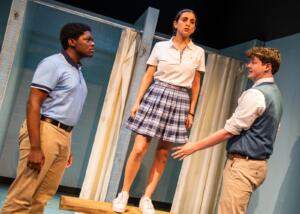
Jalen Ford (left), Aline Salloum, and Jake Bryan Guthrie. Photo by Russ Rowland.
Gratitude, by Oren Safdie, directed by Maria Mileaf, and starring Jalen Ford, Jake Bryan Guthrie, Erik Larsson, and Aline Salloum, runs through June 30th at UrbanStages, 259 W 30th St, New York.
Scenic Design by Neil Patel, Costumes by Laurie Curba, Lighting by Greg MacPherson, and Sound by Bart Fasbender.
For audiences 16+. This play contains sexual content.
Tickets starting at $40. Student tickets available for $15, with ID.
Portions of this interview have been edited for clarity and brevity.
This post was written by the author in their personal capacity.The opinions expressed in this article are the author’s own and do not reflect the view of The Theatre Times, their staff or collaborators.
This post was written by Fareeda Pyracha Ahmed.
The views expressed here belong to the author and do not necessarily reflect our views and opinions.

